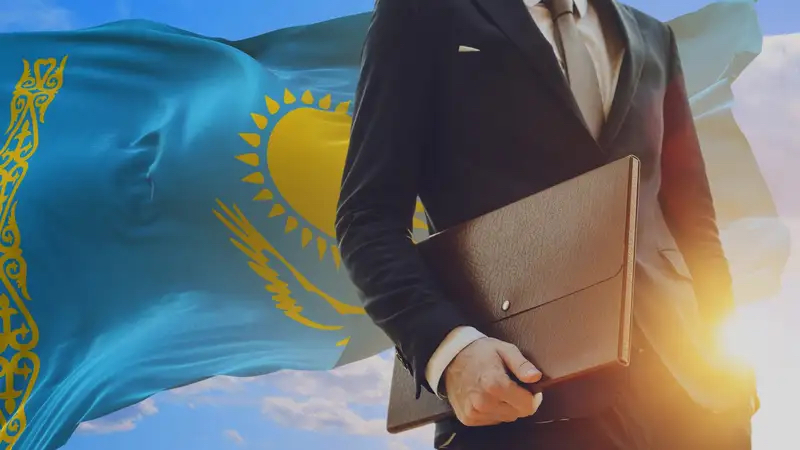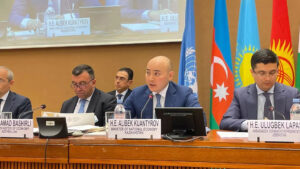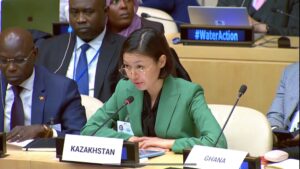ASTANA — In Kazakhstan, the pursuit of nurturing capable leaders is embodied in the Presidential Youth Personnel Reserve, an early public initiative spearheaded by President Kassym-Jomart Tokayev. Its inaugural selection took place in 2019, marking a significant milestone in its journey. Governed by the Agency for Civil Service Affairs, this initiative acts as a channel for directing the vigor, talent, and promise of the country’s youth into the corridors of governmental power.

photo credit: Zakon.kz
The Agency for Civil Service Affairs shed light on the program’s composition and impact on Kazakhstan’s evolving political landscape, reported the Zakon news agency on Feb. 9.
With 400 individuals currently enrolled, of whom 271 are already employed, the reserve boasts a notable presence within various tiers of government and private organizations. Some 34 reservists hold political positions, including three in high-level roles.

Alibek Kuantyrov, the former minister of the national economy, during interactive dialogue of ministers of the UN SPECA in Geneva on Apr. 17 photo: Minisry of National Economy
Handpicked through a rigorous selection process, these reservists represent the vanguard of Kazakhstan’s emerging leadership establishment. According to the Agency for Civil Service Affairs, the success stories of presidential reserve alumni such as Alibek Kuantyrov – former minister of the national economy, Maxim Spotkai – Chief of Staff of the Senate, and Zhandos Shaimardanov – Chairman of the Agency for Strategic Planning and Reforms are a testament to the program’s role in nurturing capable administrators and policymakers. Their trajectories from the reserve to positions of influence exemplify the transformative potential embedded within Kazakhstan’s youth.

Zulfiya Suleimenova at the UN 2023 Water Conference in March 2023 Photo credit: Permanent Mission of Kazakhstan to the United Nations.
However, the journey is not without its challenges, as evidenced by instances where individuals like Zulfiya Suleimenova and Askhat Oralov faced professional setbacks despite their inclusion in the reserve. Suleimenova, however, discovered a more fitting outlet for her talents by assuming the role of Advisor to the President on International Environmental Cooperation.
Understanding the Presidential Youth Personnel Reserve: Selection and Impact
In the 2023 selection cycle, more than 30,000 applicants contended for a coveted spot. Among them, 6,404 individuals diligently submitted comprehensive document packages. Only 50 individuals earned placement in the reserve category following the selection procedure. To say the competition is challenging is an understatement.
The selection criteria underscore the emphasis on meritocracy, competence, and dedication to public service. Key prerequisites such as citizenship, age no older than 35 years old, college-level degree, five years of working experience, and a good proficiency in the Kazakh language reflect the program’s commitment to nurturing a diverse pool of talent that mirrors Kazakhstan’s societal fabric.
Guidelines and Ethical Standards
Individuals are enrolled in the reserve for three years, subject to available vacancies and the reservist’s willingness to accept a suggested position. Appointment to a role does not warrant exclusion from the reserve.
However, the road to leadership within the presidential reserve has its pitfalls. Stringent guidelines outlined by the Agency for Civil Service Affairs underscore the imperative of ethical conduct, integrity, and accountability among reservists. The specter of expulsion looms large for those who fail to adhere to the principles of public service or engage in behavior that compromises the program’s integrity.
For example, the various scenarios leading to the expulsion of reservists include voluntary requests for expulsion, loss of citizenship of Kazakhstan, and acquisition of citizenship of a foreign state. Other circumstances encompass the commission of disciplinary offenses that mar the reputation of public service, demotion or dismissal based on performance evaluations, administrative accountability for violations against public order and morality, involvement in administrative corruption, and refusal to adhere to anti-corruption regulations, among others.
President Tokayev’s Perspective
There are, of course, concerns about the perceived lack of experience among young leaders within the reserve. President Tokayev himself acknowledged this sentiment in his interview with Egemen Qazaqstan newspaper this January. In his view, aspirations coupled with a deficit in critical self-esteem occasionally hinder young individuals from fully realizing their potential. According to Tokayev, experience undoubtedly holds value; however, he emphasizes that the innovation and fresh perspectives young leaders bring to the table are equally indispensable. He believes that experience is a commodity that can be cultivated over time.
